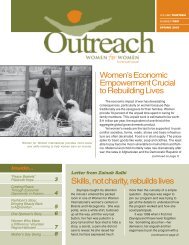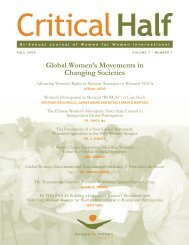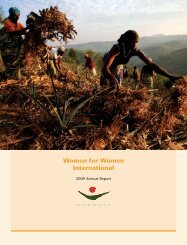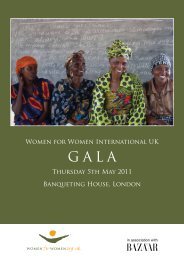Gender and Constitution Building - Women for Women International
Gender and Constitution Building - Women for Women International
Gender and Constitution Building - Women for Women International
You also want an ePaper? Increase the reach of your titles
YUMPU automatically turns print PDFs into web optimized ePapers that Google loves.
ernment, to equal access to public service <strong>and</strong> to periodic<br />
<strong>and</strong> genuine elections. The ICCPR, Article 1, delineates<br />
the right of self-determination, <strong>and</strong> Article 25<br />
articulates the right to take part in public affairs, to vote<br />
<strong>and</strong> be elected to office <strong>and</strong> to have equal access to public<br />
services. CEDAW, Article 7, not only recognizes these<br />
rights but also requires actions by states to ensure that<br />
women have equal rights to vote, to <strong>for</strong>m <strong>and</strong> implement<br />
government policy, to hold public office <strong>and</strong> to<br />
participate in non-governmental organizations <strong>and</strong> other<br />
associations involved in public life.<br />
Some constitutions specifically recognize women’s<br />
rights to participate in public life. For example, the <strong>Constitution</strong><br />
of Eritrea states: “It is a fundamental principle<br />
of the State to guarantee its citizens broad <strong>and</strong> active<br />
participation in all political, economic, social <strong>and</strong> cultural<br />
life of the country. Any act that violates the human<br />
rights of women or limits or otherwise thwarts their<br />
role <strong>and</strong> participation is prohibited.”<br />
Residence, Citizenship <strong>and</strong> Nationality<br />
The rights of nationality <strong>and</strong> citizenship are extremely<br />
important because they define which persons<br />
may be considered citizens <strong>and</strong> entitled to all the benefits<br />
that accompany citizenship. <strong>Women</strong> experience discrimination<br />
in a variety of ways in this area. In some<br />
societies, citizenship is allowed to flow only through<br />
paternal lines, women are deprived of their nationality<br />
if they marry <strong>for</strong>eign nationals or governments refuse<br />
to naturalize <strong>for</strong>eign spouses of women. Nationality<br />
rights are guaranteed in the UDHR, Article 15. CEDAW<br />
includes broad nationality protections <strong>and</strong> rights <strong>for</strong><br />
women. CEDAW, Article 9, requires states to grant<br />
women equal nationality rights with men <strong>and</strong> to ensure<br />
that neither marriage to an alien nor change of nationality<br />
by the husb<strong>and</strong> during marriage changes a woman’s<br />
nationality, renders her stateless or <strong>for</strong>ces upon her the<br />
nationality of her husb<strong>and</strong>. In addition, CEDAW requires<br />
that states grant women equal rights with men<br />
with respect to the nationality of their children.<br />
Some constitutions include either nationality or citizenship<br />
rights in their provisions. The <strong>Constitution</strong> of<br />
Cambodia, Article 33, protects against deprivation of<br />
nationality. On the other h<strong>and</strong>, the <strong>Constitution</strong> of South<br />
Africa, Section 3, outlines equal rights to citizenship <strong>and</strong><br />
its benefits.<br />
Economic, Labor, Social <strong>and</strong> Cultural Rights<br />
Economic, labor, social <strong>and</strong> cultural rights are essential<br />
<strong>for</strong> women’s livelihood. The fundamental international<br />
human rights document that guarantees these<br />
rights is the ICESCR. Article 3 of the ICESCR obligates<br />
states to “ensure the equal right of men <strong>and</strong> women<br />
to the enjoyment of all economic, social <strong>and</strong> cultural<br />
rights set <strong>for</strong>th in the present Covenant.” Additionally,<br />
CEDAW addresses some of these areas, requiring states<br />
to ensure equal rights <strong>for</strong> women in employment, health<br />
care <strong>and</strong> economic <strong>and</strong> social life.<br />
A few constitutions specifically address women’s<br />
rights in these areas. The <strong>Constitution</strong> of Cambodia,<br />
Article 45, protects women from losing jobs due to pregnancy<br />
<strong>and</strong> provides <strong>for</strong> the right of maternity leave without<br />
loss of benefits. Article 45 also obligates the government<br />
<strong>and</strong> society to create opportunities <strong>for</strong> women<br />
to get employment, medical care, education <strong>for</strong> children<br />
<strong>and</strong> decent living conditions.<br />
Affirmative Action<br />
Affirmative action can be an effective mechanism<br />
to rectify past discrimination <strong>and</strong> to create opportunities<br />
<strong>for</strong> disadvantaged groups, including women, to<br />
achieve equality. Although affirmative action is not mentioned<br />
in the UDHR, ICCPR or the ICESCR, CEDAW<br />
allows <strong>for</strong> affirmative action <strong>for</strong> women. Specifically,<br />
Article 4 recognizes that governments may adopt “temporary<br />
special measures aimed at accelerating de facto<br />
equality between men <strong>and</strong> women.”<br />
Some constitutions include affirmative action provisions.<br />
The <strong>Constitution</strong> of South Africa, Section 9,<br />
provides that “legislative <strong>and</strong> other measures designed<br />
to protect or advance persons, or categories of persons,<br />
disadvantaged by unfair discrimination may be taken.”<br />
The <strong>Constitution</strong> of Ug<strong>and</strong>a, Article 33, provides that<br />
“women shall have the right to affirmative action <strong>for</strong><br />
the purpose of redressing the imbalances created by history,<br />
tradition or custom.” The <strong>Constitution</strong> of India,<br />
Article 15, <strong>and</strong> the <strong>Constitution</strong> of Bangladesh, Article<br />
28, both allow the state to institute affirmative action<br />
<strong>for</strong> women.<br />
Reconciling <strong>Women</strong>’s Rights With<br />
Customary <strong>and</strong> Religious Laws<br />
Customary <strong>and</strong> religious practices often have negative<br />
repercussions <strong>for</strong> women. In countries where there<br />
are entrenched customary <strong>and</strong> religious laws, constitution<br />
drafters must determine how to respect these practices<br />
while protecting human rights <strong>and</strong> gender equality.<br />
The constitution may reaffirm the importance of cultural<br />
<strong>and</strong> religious traditions, but it should also state<br />
clearly that these sources of in<strong>for</strong>mal law must con<strong>for</strong>m<br />
to international law, especially regarding women’s rights,<br />
<strong>and</strong> that the state does not condone practices that dis-<br />
CRITICAL HALF 11







